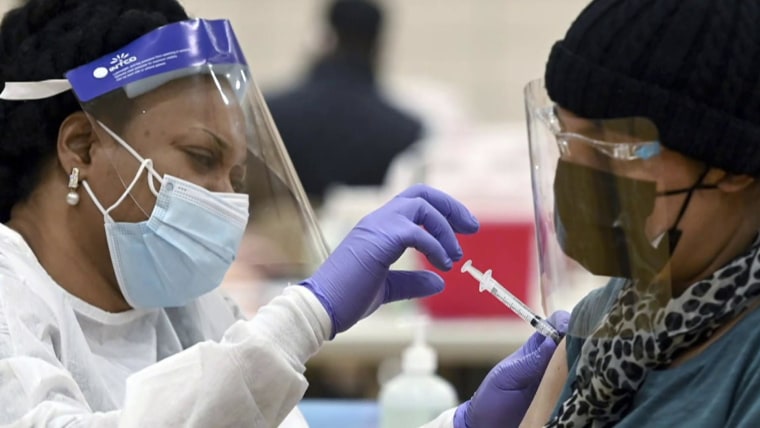The slow rollout of Covid-19 vaccines — including delayed deliveries, states receiving fewer doses than expected and difficulty scheduling appointments — has led to some consternation that people may not be able to get their second dose within the prescribed time frame of 21 or 28 days.
While potentially worrisome, public health experts across the country say there's no cause for concern.
Full coverage of the coronavirus outbreak
The Centers for Disease Control and Prevention, national pharmacy chains, infectious disease experts, and doctors on the front lines of treating patients say that there is some wiggle room for that second dose — while also emphasizing that it's still essential to get fully vaccinated as soon as possible.
"The second dose should be administered as close to the recommended interval as possible," the CDC said in an update to its website Thursday. "However, if it is not feasible to adhere to the recommended interval, the second dose of Pfizer-BioNTech and Moderna Covid-19 vaccines may be scheduled for administration up to 6 weeks (42 days) after the first dose."
Rina Shah, group vice president of pharmacy operations and services at Walgreens, which plans to administer doses at its stores across the country, said that "patients can receive the second dose as long as it follows the immunization window," meaning that the second dose is given no earlier than the designated time frame.
"We encourage patients to schedule the second dose appointment as close to the earliest appropriate date, but a bit after is OK," Shah said.
That runs counter to the official guidance from the Food and Drug Administration and Pfizer-BioNTech and Moderna, the drugmakers behind the two vaccines currently available in the U.S., which states that two doses, given at specific intervals, are necessary for maximum protection. For Pfizer, that interval is 21 days; for Moderna, 28 days.
Those time frames come from how the vaccines were administered in clinical trials, meaning the only data available look at how well the vaccines worked when given either 21 days apart for Pfizer, and 28 days apart for Moderna.
But the body's immune response doesn't expire after a set interval.
"Your immune system is really smart," said Dr. Buddy Creech, director of the Vanderbilt Vaccine Research Program at Vanderbilt University Medical Center in Nashville, Tennessee. "It doesn't forget what it saw the first time," he said, referring to the first vaccine dose.
Creech, who has overseen clinical trials for Moderna, said the vaccines should work as expected, even if the second dose is delayed a month or more than what is recommended.
"Do not panic. Even if it's four weeks, six weeks, eight weeks before you can get that second dose, it's fine from an immune system standpoint," he said.
The second dose of both the Pfizer and Moderna vaccines function as a reminder to the immune system.
Download the NBC News app for the latest news on the coronavirus
"Like any defense mechanism, if the immune system sees something once, it may be prepared the second time," said Dr. Bruce Y. Lee, a professor of health policy and management at the City University of New York. "If you're exposed to something a second time, it tells you — hey, you've got to treat this seriously."
That could happen even if the second dose was given as much as a year later, said Dr. Diane Griffin, an infectious disease expert at the Johns Hopkins University School of Medicine, though there is no data showing that giving the second dose that much later would lead to the 95 percent effectiveness seen in the clinical trials.
"The main reason for the booster is to get the immunity up to a high enough level that you're confident that you're protected," Griffin said.
Still, Griffin stressed the importance of getting fully vaccinated sooner rather than later.
"People may think that they're protected because they got one dose," she said. While the first dose does offer protection, "there needs to be an emphasis that a second dose is necessary" for full protection.
Lee agreed, adding that the better protected any individual is, the better it is for others around them, too. "If other people are protected, the virus can find fewer opportunities to spread," he said.
CORRECTION (Jan. 21, 2021, 4:51 p.m. ET): A previous version of this article misstated the number of days recommended between each Covid-19 vaccine. The interval for Pfizer is 21 days (not 28), and the interval for Moderna is 28 days (not 21).
Follow NBC HEALTH on Twitter & Facebook.
Health - Latest - Google News
January 22, 2021 at 03:39AM
https://ift.tt/2Mf91XD
Timing of second Covid vaccine doesn't need to be exact. Just get it, experts say. - NBC News
Health - Latest - Google News
https://ift.tt/2zrj9Ud
Bagikan Berita Ini
















0 Response to "Timing of second Covid vaccine doesn't need to be exact. Just get it, experts say. - NBC News"
Post a Comment